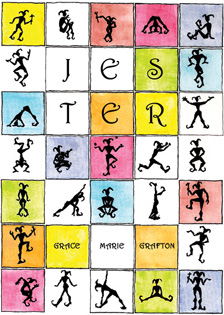
by Grace Marie Grafton
Publication date: November 1, 2013
Available for $15.00 from your local bookstore or
www.amazon.com
Reviews
“Beware these seemingly whimsical parables – they are parabolas that cause lightness to swerve unexpectedly to face us with disquieting revelation. Quick as ardor can turn into irony, Grafton can turn “fecundity [into] a fragmented / architecture.” She has the trickster’s talent to show that “belie” is often hiding at the core of “belief.” There’s an angle of attention when every dazzling glint suddenly mirrors back our own face. That shifting guise is her gift, our risk.”
– Rusty Morrison, author of After Urgency, winner of the Dorset Prize, Tupelo Press
“Grace Grafton’s Jester is a ‘frolic experiment’ of poetic improvisation. As a bricoleur of language, Grafton riffs on a line from Merwin, Rumi or Lorca, hones in on an image from Chagall, or Klee. She delivers a tableau rich in verbal acrobatics and metaphoric juggling. Reading Jester, one feels lines ‘glowing…like doves in a Giotto fresco.'”
– Terry Ehret, author of Lucky Break and Night Sky Journey
Flying home from a lost wedding
The hasp of the chest flew open when it
landed in the spring-awakened field
two miles out of town near the willow-strewn
creek we remember catching frogs in.
The parachute bubbled down around it
but too late, the animal spirits had
escaped. The air around the chest, around
the parachute’s silk, was in a dither,
worried that the music, too, would leak out,
which, of course, it did, slithering like some
slinky water creature heading for the creek
and, if it made it, the whole town
and all its environs would become parade.
The animal spirits would enter the bodies of
men who would feel compelled to drink
creek music. Soon the hare would be
honking the cornet, the deer squeezing
out accordion wheezes and the sax –
well, you remember the dromedary
has been waiting since that instrument’s birth
to introduce to the world the Camel Rag.
Title from poem by Rosmarie Waldrop
The time for standing to one side is near
but not yet. Today she’ll be right in
the middle, scrambling against all odds
to center stage, while still maintaining
her rhythm. She doesn’t want to appear
rushed. She’s wary of the palms’ prickly
tips and the tropical humidity. Her coiffure
mustn’t droop despite the damp.
It’s true, she has the blues, they even
show up in her clothes, much as she
mulls the yellows and pinks. Dawn
and the blotting of night. She has always
thought in reverse, and considers thought
itself to be as ancient as the magnolia
trees that line the walkway through
the park by the river. Where the temporary
stage has been constructed. Where she’ll
perform, as long as they don’t expect
a sonata or roundelay or political speech.
How ruthless the public is, yet if she wishes
her reputation not to dwindle, she’ll remember
the nature of all performance is despair.
Title from poem by John Ashbery
Circus
The moment when he discovered he liked chickens,
the moment when the woman in her floral dress
became the diadem on the horse’s back,
the circus moment, embrace moment, the owl
turning its head 180 degrees,
the astounded moment.
She practiced slipping down the underside
of the horse, horse practiced equanimity,
there was rehearsal and jest between
them, she as acrobatic as a feather
escaping from a gyre, the horse’s
face was green with envy, her floral dress was
a lofty impediment. She liked best when her head
hung down. The moment she discovered
how attractive were the horse’s knees.
There was some danger.
The villagers mocked his love of chickens,
especially the red ones, the red and purple,
black-collared banty roosters, hens with a flock of
russet progeny. The moment when the horse’s mane
looks blue, moment in the sky.
To Marc Chagall’s painting, “Circus (Circus Rider)”